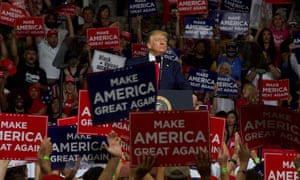The numerous challenges of 2020 have hit Trump hard – but the conditions are ripe for a repeat surprise victory, some experts say

Photograph: Mike Logsdon/RMV/REX/Shutterstock
If Donald Trump wins the 2020 election and returns to the White House it won’t be by a landslide. And if he’s going to win at all he will need the US economy to rebound, to see suburban voters swing back in his direction, and overwhelm voters with a sense of optimism about another term under Trump.
That’s the verdict of about a dozen Republican veteran political strategists and operatives spoken to by the Guardian. Those priorities underscore the precarious situation the US president finds himself in. Most national and statewide polls show the former vice-president Joe Biden leading Trump, often by comfortable margins.
The numerous challenges of 2020 have hit the president hard. He has struggled to offer consistent leadership on the coronavirus and been lambasted for mishandling a pandemic that has killed more than 100,000 Americans. The resulting economic crisis has seen more than 40 million people lose their jobs. He’s also received severe criticism in responding to protests over the death of George Floyd, an African American man who died under police custody, and suffered the usual political scandals, such as a roasting by former top adviser John Bolton.
None of that, though, means Trump has no chance of re-election, these strategists said.
Contrary to the polls and the tumbling economic indicators, some Republicans across the country have shown a strong sense of optimism that the conditions are ripe for a repeat of Trump’s surprise victory in 2016.
But that’s only if a few important fundamentals change. The economy is the top priority followed by whether Trump can win over key voting constituencies beyond his core base. He also has to convince the electorate that a second term will less chaotic than the first.
“He has to remind people that what he said he would do he’s done. Clearly the things out of his control are the only things that are hampering him,” said Republican pollster Rex Elsass. “So he needs to remind people that when things are normal – and they will be! They won’t be chaotic forever – we have an opportunity to continue to restore the economy and strengthen America’s position internationally. The optimism that had been in America can be restored and will be restored.”
To an extent, the Trump campaign has already begun to pivot in its approach. Trump’s campaign has tweaked a key pillar of its message, now promising a “great American comeback” after the catastrophic financial downturn coinciding with the coronavirus pandemic.
The economy is a longtime silver bullet for American political campaigns. James Carville, the strategist for Bill Clinton, propagated the phrase “it’s the economy, stupid” and for the operatives who see a hidden path for a Trump victory, it’s through the economy.
“If we have an economy in which unemployment goes back down to 5% or below, if we have a Dow that is above 40,000 … I think in the fall you’re going to have a situation where people are going to forget all the craziness and give him credit for what will be seen as a pretty remarkable if not historic turnaround,” said Republican pollster Chris Wilson.
But Trump can’t ignore the specter of Joe Biden, his Democratic rival.
Republicans regularly mock the former vice-president and de facto Democratic nominee for essentially campaigning from his basement, but he still polls ahead of Trump in head-to-head matchups. What’s more, Trump is viewed more unfavorably than Biden. A Quinnipiac poll released Thursday found a majority of those surveyed view Trump unfavorably compared to a plurality who view Biden unfavorably. Both candidates are underwater in favorability.
So to win, Trump will have to successfully frame Biden as an untenable choice to most voters.
“It’s hard to imagine Donald Trump winning a referendum on his presidency unless the world changes dramatically between now and November,” said Whit Ayres, a Republican pollster. “So that means his best hope of re-election is to make it a choice where Joe Biden becomes defined as an unacceptable alternative. That’s going to be substantially more challenging than it was in 2016 because Joe Biden doesn’t generate the same degree of animosity as Hillary Clinton did.
Ayres though said that unlike in past presidential cycles, the 2020 election is not shaping up to where a small and select set of states is the only pathway for either candidate. Even though Biden is leading in key midwestern states such as Wisconsin and Michigan there are other pathways to victory.
“There are many other states that are well beyond the big three of the upper midwest that appear at this point to be in play. I mean you’re looking at Arizona, Georgia seems close, Texas seems close, Iowa and Ohio seem like tossups right now that Trump won comfortably,” Ayres continued. “Biden seems to have a pretty significant lead in Michigan and Pennsylvania is his home state. Wisconsin seems to be the closest of the big three up in the rust belt. There are a lot different scenarios where Biden could get to 270 as well as Trump getting to 270 because there are so many more states in play than the half dozen that we usually focus on.”
Top Democratic officials hope that a groundswell of support among minority voters will carry Biden to victory, a view shared by the Republican strategist Stuart Stevens. Stevens argued that the deciding factor for 2020 would be turnout of African Americans and white voters, not any specific state.
“If non-white turnout goes back to what it was in 12, 08, even 04, Trump should lose,” Stevens, who has joined the anti-Trump Lincoln Project, said. “If it doesn’t he has a shot.”




